Adventurous Kate contains affiliate links. If you make a purchase through these links, I will earn a commission at no extra cost to you. Thanks!
We have now been living with COVID for nearly two years. I don’t have to say anything about how it’s been, because you know well enough.
But you may be curious about how international travel is looking at this point. Can you even travel right now? What do you need to know? What do you need to plan for?
After several trips over the course of a year and a half, this is the dossier on what I know about pandemic travel.
Table of Contents
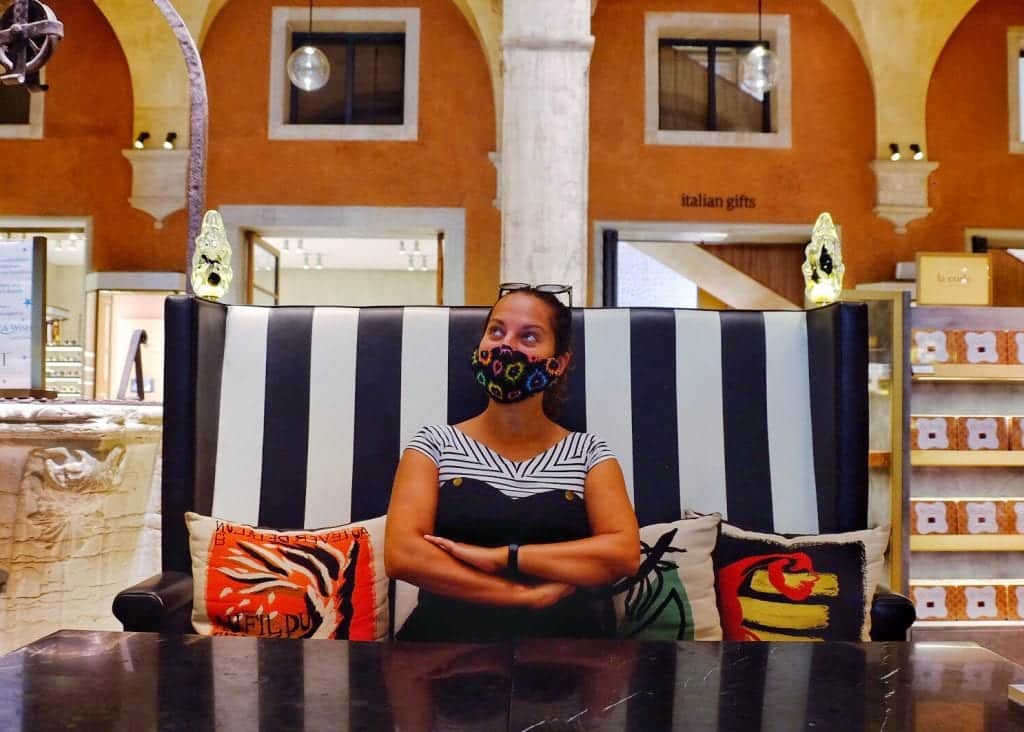
My International Travels During COVID
I was trying to move from the US to Prague when the pandemic began — then they shut their doors to Americans. I ended up on an Odyssey of sorts until the Czechs let me in. Here’s the rundown:
I was in Mexico in March 2020, when COVID became a global pandemic and worldwide restrictions began.
- April 2020: I flew from Mexico City to Boston via Miami.
- June 2020: I took the train from Boston to New York and flew from New York to Belgrade.
- June through September 2020: I traveled in Serbia, Croatia, and Italy.
- September 2020: I was allowed to return to the Czech Republic and traveled from Venice to Brno by overnight bus.
At this point, cases rose sharply worldwide and I didn’t leave Prague for months. My next trip anywhere would be to get my vaccine.
- April 2021: I flew from Prague to Boston via Amsterdam and got my first Moderna shot hours after landing.
- April through May 2021: I based in Massachusetts and visited the Berkshires.
- May 2021: I flew back to Prague via Amsterdam days after my second vaccine shot.
- June 2021: I flew to Pula, Croatia, via Frankfurt, for four days.
- July 2021: I flew direct to Catania, Sicily, and spent two weeks in the Aeolian Islands.
- August 2021: I flew direct to Bergamo, Italy, and spent four days in Aosta Valley.
- August 2021: I flew direct to Varna, Bulgaria, for five days.
- September 2021: I flew to Boston via Madrid and based in the US for five weeks, spending a lot of time in New Hampshire.
- October 2021: I flew from Boston to Halifax, Nova Scotia, via Toronto, and spent a week in Canada.
- October 2021: I flew from Boston to Prague via London.
- November 2021: I flew direct from Prague to London for a week.
Besides that, I did some local exploration in the Czech Republic.
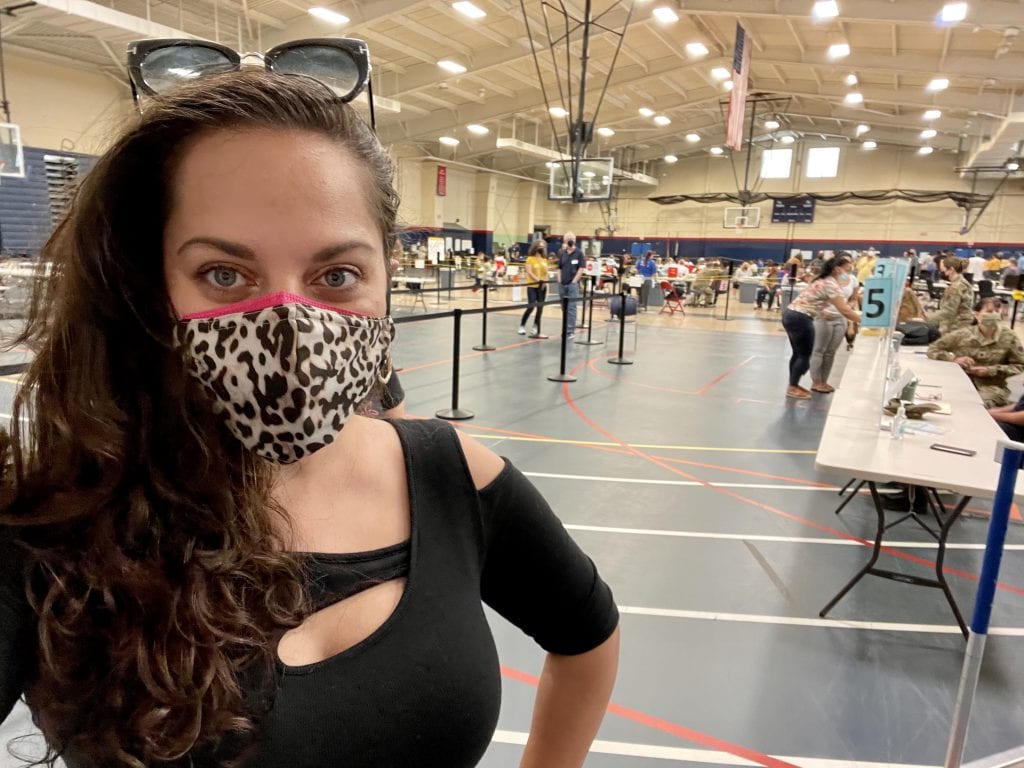
International Travel is a Privilege for the Vaccinated. Period.
I’ve said this many times and will continue to say it: if you’re not vaccinated, you should not be traveling internationally. The vaccine is safe, effective, and has been given to billions (BILLIONS!) of people.
Not getting vaccinated is tantamount to putting people around you at risk — which is why so many countries are banning unvaccinated travelers.
And for those that still welcome unvaccinated travelers, albeit with a test, things are getting harder for them. Many countries, including the Czech Republic, Canada, and Italy, as well as cities like New York, are requiring proof of vaccination or recent negative test results in order to dine indoors. Do you really want to spend your trip getting tested every three days?
Yes, there are places where you can still travel internationally without a vaccine or even a test — like Mexico — but these places are becoming fewer and further between as vaccinations rise globally.
I continue to be appalled by the behavior of unvaccinated travelers putting locals at risk just because they feel like it. Please don’t be like the person in the Mexico expat group who tested positive and asked people how to fake a negative result for their flight to the States. So many people popped up with suggestions that I won’t share here. Selfish pieces of shit.
Overall, at this point in time, I don’t know how to explain that you should care about other people.
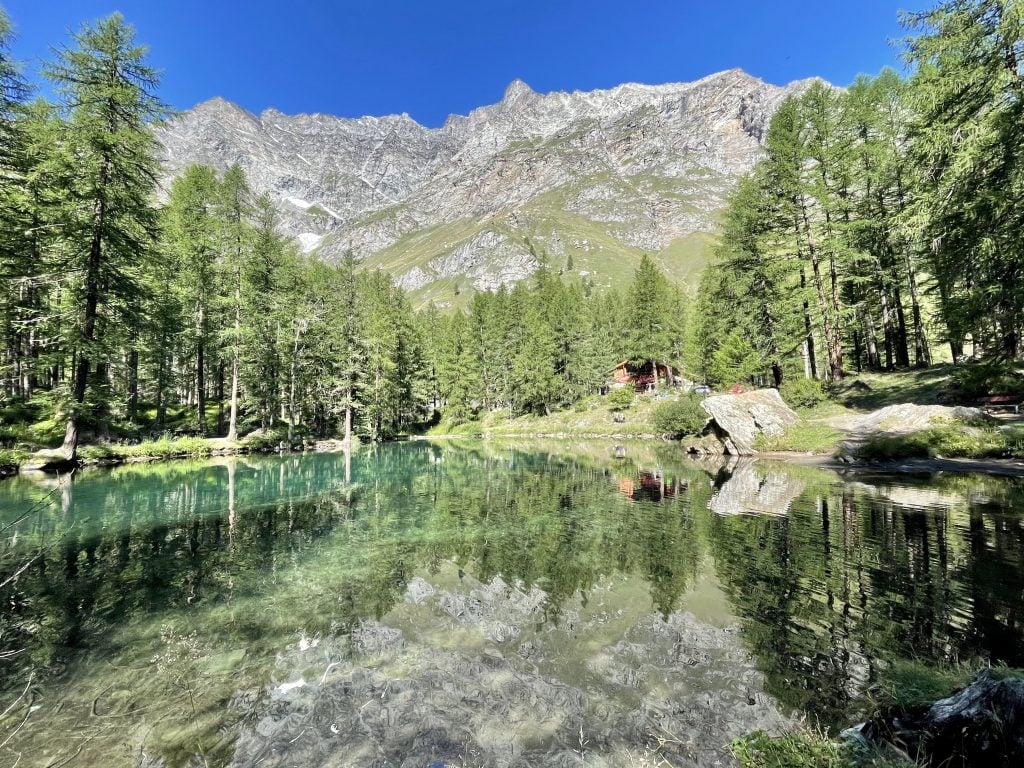
Choosing the Right Destination Can Be Complicated
How do you choose the right travel destination? It’s difficult because you can book a trip to somewhere with very low COVID in August, and then two months later, it can have the highest case rate in the world. (Unfortunately we’re going through a rough patch here in the Czech Republic, though it’s not as bad in Prague because of the high vaccination here.)
For that reason, some people are booking closer to travel time; others cross their fingers and hope for the best.
First off, there is no such thing as a perfect destination. Even New Zealand has plenty of community transmission now. But there ARE such things as better and worse destinations.
Here are questions to ask yourself before booking an international trip during COVID:
What is the COVID case rate? Is it going up or down? The New York Times and Worldometers are the two resources I use for tracking cases.
What is the country’s vaccination rate? Also go to the New York Times for that.
How are hospitalizations? Keep in mind that if COVID has filled the hospitals, you’ll have trouble finding care for anything from appendicitis to a broken ankle. Local resources are best for tracking hospitalizations.
How are things in the specific part of the country I’m visiting? This is CRITICALLY IMPORTANT and is too often overlooked.
Different regions can have their outbreaks at different times. Post-vaccine, politically conservative areas in North America and Europe tend to have worse outbreaks than politically liberal areas.
At the same time, it’s possible for cities to be hit hard while more rural areas and islands are fine. When I was in Korčula, Croatia, they had had zero cases ever, while Split had hundreds. Earlier this year I was in calm Massachusetts at a time when Florida hospitals were full.
But you won’t know the details until you take a look. Local resources will show you more detail.
Can I spend most of my trip outdoors? This isn’t asked as often as it should — but it’s been a primary consideration for me. With the exception of one trip (London), everywhere else has been outdoors-oriented. I’ve never done so much hiking as I did in 2021 (Aeolians, Aosta, Czech Republic, AND New Hampshire!).
Croatia was a very good choice during COVID because literally everything could be done outdoors. Outdoor exploration, outdoor dining, even outdoor transportation (lots of outdoor boat trips).
And in Varna, Bulgaria, we attended our friends’ wedding — but it was very small, it took place outdoors at a beach club, and we tested before and after. That felt like a decent level of risk. Had it been indoors or larger, we probably would have passed.
Can my trip be canceled? Many airlines and travel organizations have been introduced more flexible cancellation policies since COVID began. Whatever you choose to do, make sure that everything can be canceled.
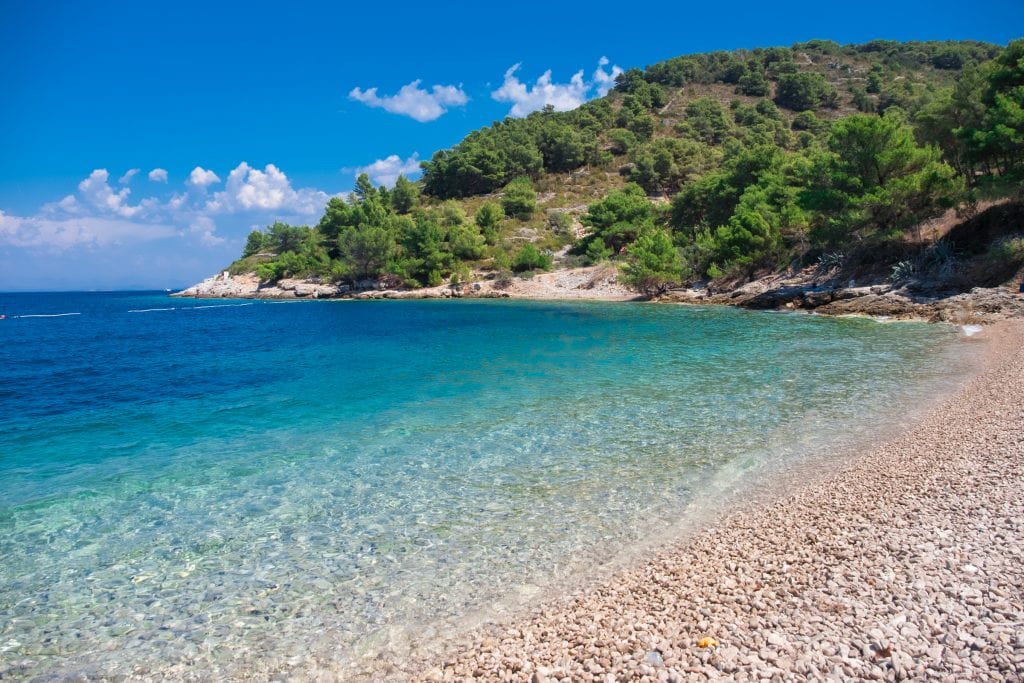
Entry Rules are Constantly Changing
So what are the rules for travel these days? You need to stay on top of things, because the rules are changing all the time. Both for the vaccinated and the unvaccinated.
I find that the best resources are the embassy websites.
They may require proof of vaccination (and all WHO-approved vaccines are pretty much universally accepted — i.e. if you’re a Brit who got Astra-Zeneca, you can visit the US, even though the US doesn’t use Astra-Zeneca).
They may require a PCR or antigen test.
They may require you to fill out a form and present proof of filling out the form (the Czech PLF form gives you a QR code, but immigration mostly ignores it).
They may require you to quarantine (increasingly rare for fully vaccinated travelers).
They may require you to take an additional test after arrival (the UK requires an antigen test on day 2).
They may require something else entirely. Croatia, for example, required proof of paid accommodation for much of the pandemic. They wanted to make sure you are economically investing in the country. They have since stopped requiring this.
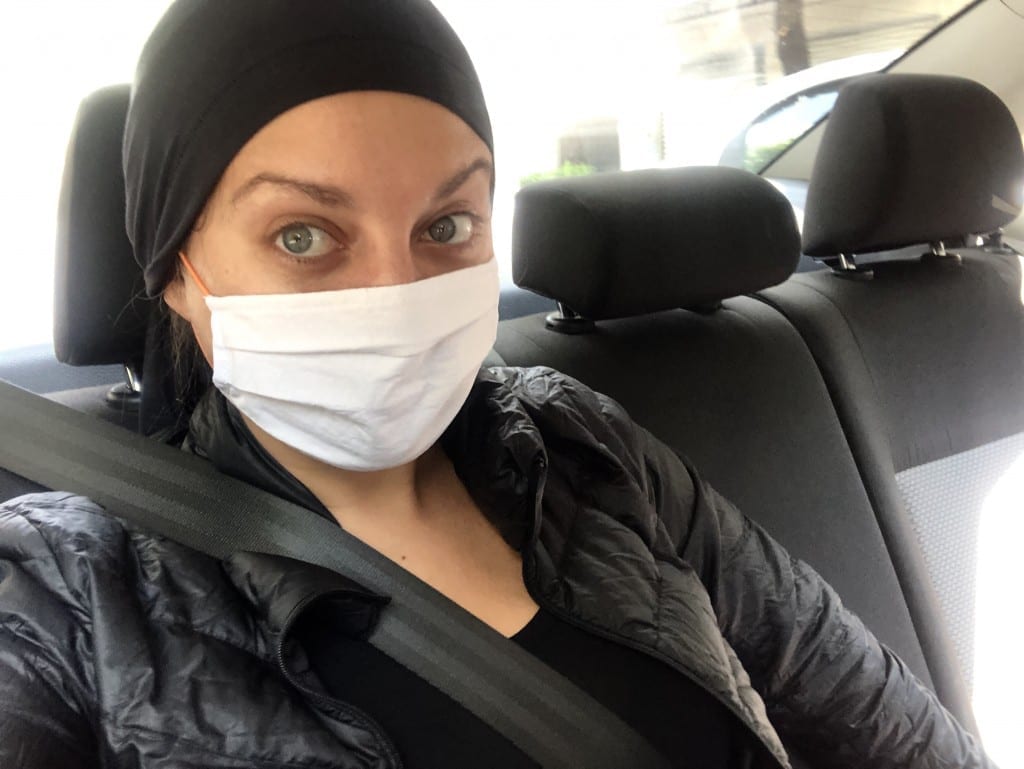
Flying Might Be Easier Than You Think
I was so nervous for my flight back to the US in April 2020 — it was the early days of COVID and we had no idea how to combat the virus. People were sanitizing their groceries. I actually turned a tank top into a do-rag to keep the virus out of my hair and washed my hands five times in the airport bathroom in order to change my mask.
Since then, things have changed. We now know the virus doesn’t get in your hair, and you don’t have to wash your hands before and after you touch your mask. Instead, virtually every airline requires masks to be worn for every flight, except when eating, drinking, or taking oral medication, and that’s about it.
I don’t worry much about flying — I think shopping at the grocery store is far riskier. Still, here is some information:
Should you wipe down your seats on a plane? I actually do now — not to prevent COVID (it doesn’t do much if anything for COVID transmission), but to prevent the common cold and other illnesses passed by touching germy surfaces.
Is it safe to take your mask off to eat or drink on a plane? Again, nothing is 100% safe. I would consider whether the destination where you’re going requires travelers to vaccinated or at least tested, and use that as a factor.
(Once I ate a ton of McDonald’s at JFK Airport, and that kept me full my entire nine-hour flight to Belgrade.)
Do you need to get to the airport extra early during COVID? I haven’t seen a need beyond the standard two hours, but it doesn’t hurt! I worry if I’m not at the airport super early, anyway. Sometimes lines take a bit longer if they’re checking proof of vaccination and forms for the arrival country.
Do you need to mask in airports? Almost always, unless eating, drinking, or taking oral medication. But there were some people NOT masking at Heathrow recently, including airline staff, which left me flabbergasted.
Are flights crowded or empty? Sometimes crowded, sometimes empty.
Are flights cheaper or more expensive right now? Again, it depends, but the super-cheap flights in the earlier days of the pandemic are now over.
Are people angrier or more aggressive on flights? I personally have not experienced this, but I understand this to be more of a thing on domestic flights in the US.
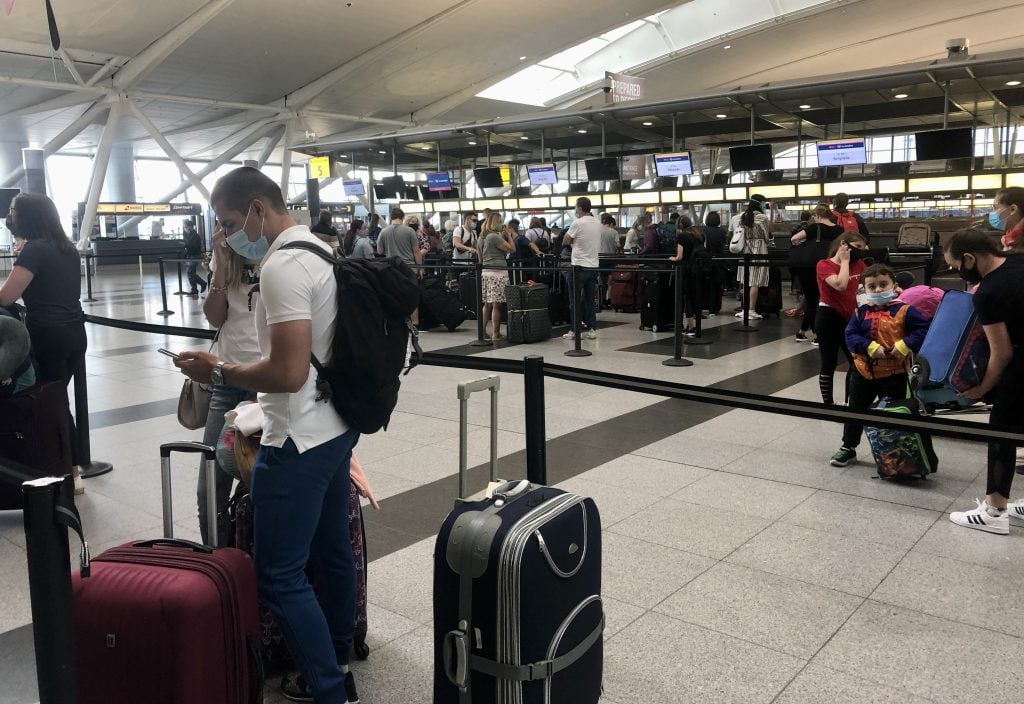
There May Be Requirements For Your Layover Airport
In the past year and a half, I’ve flown through two airports that needed an additional form filled out for transiting passengers: Madrid Barajas and London Heathrow.
I had no clue about the Madrid requirement and neither did anyone else in the check-in line (!) — Iberia gave us zero information when we booked our flight. Everyone was hunched over their phones, filling in the form, before we would even be allowed to check in.
Because of that, I recommend checking requirements for your layover airport before arriving.
Also consider that this could add additional time to your layover. I had around two hours in Madrid, and Madrid is an immense airport in normal times — it takes quite a long time to walk from the Schengen terminal to the international terminal.
We had to go through a few additional document check lines in Madrid, which added on more time. I barely had a time to grab a jamón iberico sandwich (HOW CAN YOU NOT while transiting in Spain?) before jumping on my flight.

Fast PCR Tests Might Be Hard to Find
Many countries require a negative PCR test for entry. Most need it to be taken within the last 72 hours; some places require 48 hours.
And that requirement can vary as well — some countries base it on the past 72 hours of your flight’s departure, while others base it on your flight’s arrival. Again, this is something to be researched ahead of time.
You might be lucky enough to live somewhere like the Czech Republic or Germany or New York City, where free rapid PCR tests are the rule, not the exception.
But it has been SO difficult finding fast PCR tests in Massachusetts, which is paradoxically the state with the best healthcare in the US.
So many places say, “We usually get it back in 48 hours,” but it could be longer. This was the case when one place “sent it to the slow lab” — their words — and I panicked and had to find a rapid test.
I have spent so much time on the phone with labs in the Greater Boston area, and I always ask, “Where can I get guaranteed PCR results within 48 hours?” and THEY NEVER KNOW. The airport test place is one possibility, but they’re not open on the weekend anymore.
At one point I had to drive up to Manchester to get a test at the Mall of New Hampshire, which actually promised rapid PCR results. It cost $197 and I got results in 26 minutes.
So please do your research on PCR tests in advance and book way ahead of time.
Another point — not everywhere may be doing free or cheap PCR tests anymore, even if they used to.
In Massachusetts, in May 2021 they didn’t ask for the reason for the PCR test; when I told them I’m an American residing in the EU, they actually marked me as “homeless” and gave it to me for free. (Insert Jean-Ralphio “TECHNICALLY I’M HOMELESS” gif.)
In October, however, they asked me whether the test was needed for travel or work. PCR tests were only free or cheap if you had been exposed to someone with COVID. You now have to pay otherwise.
If you’re traveling to the US from another country, this is something to keep in mind. Tests are rarely free if you don’t have health insurance, unless you’re somewhere like New York that makes it easy and free.
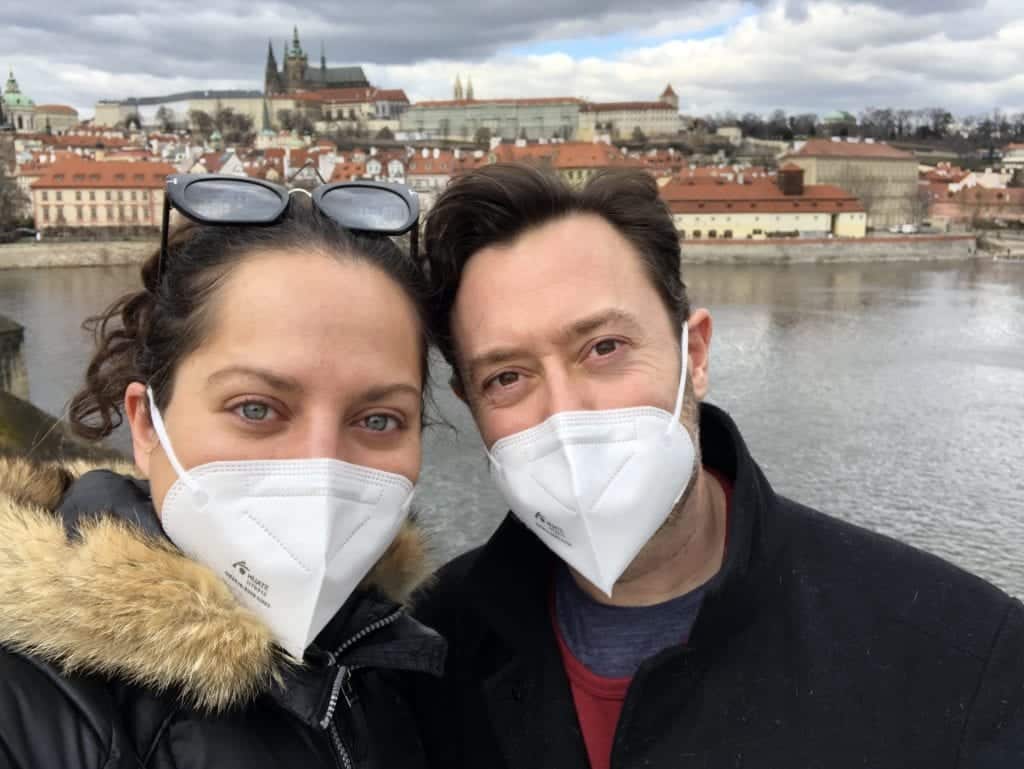
Bring the Right Kind of Face Masks
Cloth masks are the standard masks in the US, but this isn’t the case anywhere else I’ve visited in Europe. In fact, cloth masks are discouraged in much of the world because they don’t provide sufficient protection.
Respirator masks — N95s, K95s or similar — are required in the Czech Republic, Germany, and several other Western European countries.
One American friend of mine was asked to leave a store in Germany because he had on a cloth mask. He was on a river cruise and I was shocked that the river cruise company didn’t tell their primarily American passengers that cloth masks are not accepted in much of Europe!
Bring KN95 masks to be on the safe side. You may also want to buy more once you arrive. Do some research and see where you can pick them up in person. It’s a good idea to avoid the touristy areas where they might be more expensive.

Plan Your Travel Activities Ahead of Time
Many activities are not running as normal, or are running on a limited schedule. A favorite tour or event might not be taking place at all; a favorite restaurant might be shut down temporarily or permanently. Plan for this in advance so you won’t be disappointed.
Check out their new COVID-era schedules on their websites. And many activities require proof of vaccination, so bring your vaccine card with you.
Timed tickets are needed for some attractions, so I recommend taking a look through and booking everything you need to book before your trip. When I was in the Berkshires this past May, virtually everything required a timed ticket — which made it really hard to plan my itinerary.
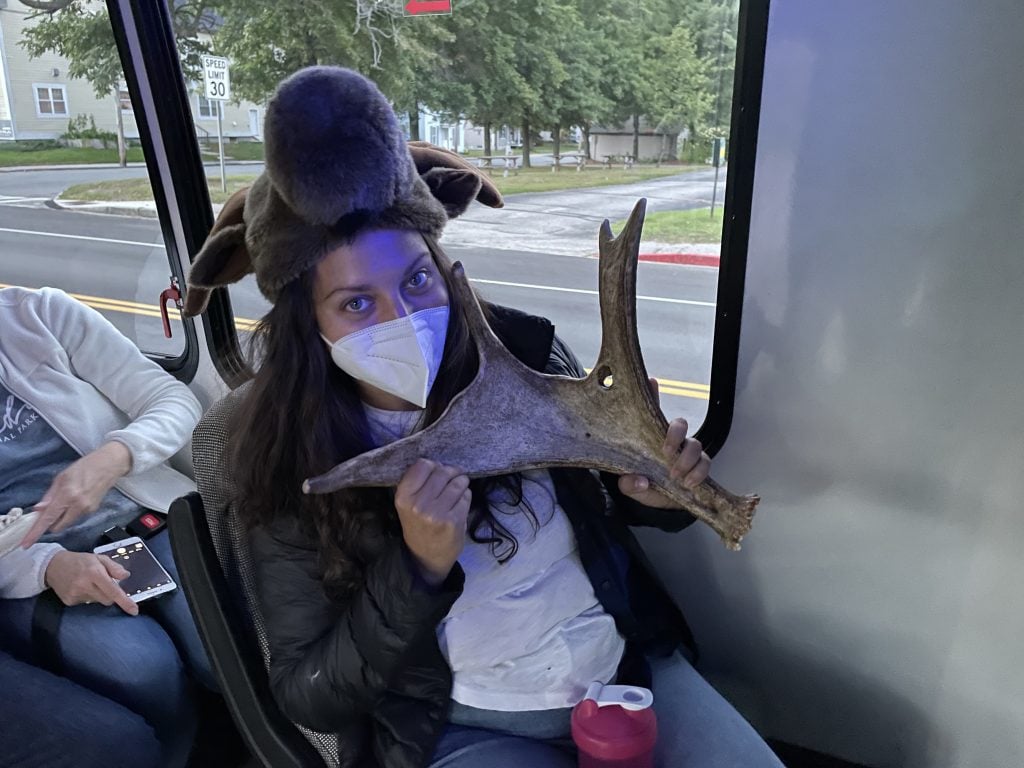
Masking Culture Shock is Real
Masks have been mandatory on public transportation in Prague since COVID began, and there is about 99.5% compliance. (Occasionally you see a drunk person who forgets the mask, but that’s about it.)
It was the shock of my life when I got to London and masking on the tube was at around 50% compliance.
Being in the UK made me uncomfortable in many ways. They seem to be taking the approach of asking people nicely to please wear masks — and it is not working.
I’ve also heard that the Netherlands and Sweden have very little masking, and it made me frustrated whenever someone would show up unmasked to an activity in New Hampshire.
Conversely, other countries may be doing things better than you expect. I was in Italy and Nova Scotia on the days that they began to require proof of vaccine to go virtually anywhere indoors. (They’ve recently started doing the same for indoor dining in the Czech Republic.)
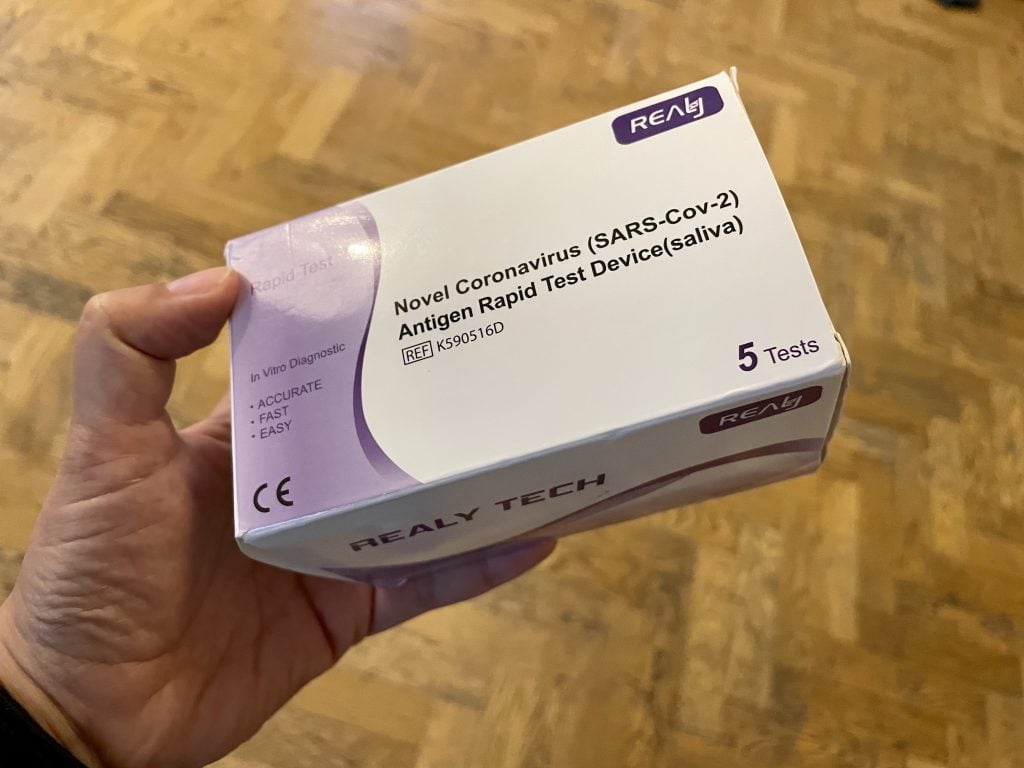
Stock Up on At-Home Tests While Abroad
It makes me furious that at-home antigen tests are expensive and hard to find in the US. In the Czech Republic, they’re around $3 each and you can find them easily.
Because of that, I’ve stocked up on at-home antigen tests and I bring them on all my travels. As soon as I feel the slightest tickle in my throat, or before I spend time with someone young or immunocompromised, I take a test.
Are they 100% accurate? No, especially early in your illness. (More on that from the CDC here.) But they are a LOT more reliable than twiddling your thumbs and doing nothing.
I recently had a cold for the first time in a year and a half and I took SO many antigen tests (along with a PCR test) just to make sure it wasn’t COVID.
If you’re traveling outside the US, I highly recommend buying a ton of at-home tests to take home with you. They are so convenient and low-hassle.
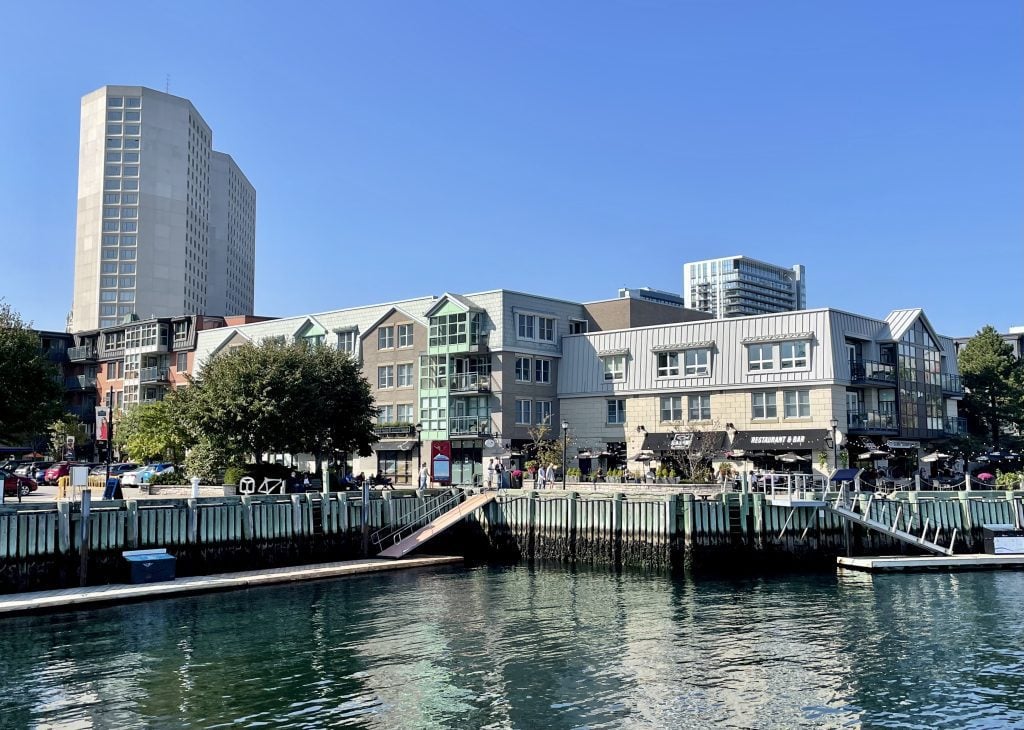
Book an Antigen Test to Return to the US
Even if you’re returning to the US as a fully vaccinated American, you need to get an antigen test beforehand. (Not a PCR test, but of course PCR tests are also accepted.) And depending on where you are, it can be a huge pain.
It’s easy in the Czech Republic, where you can get appointments all day. But in Canada, I had to search and search to find a place that actually had an open appointment that worked with my busy campaign schedule — and this was several days in advance.
It can get expensive, too — in Canada I paid $75 CAD ($60 USD) for an antigen test at Switch Health. I asked my accountant and nope, I can’t count medical testing as a business expense, even if it’s for a business trip.
Antigen tests are not checked at the border, but they are checked before your flight. In some cases, like for my Delta flight from Amsterdam to Boston, you need to fill out an attestation that says you got a test.
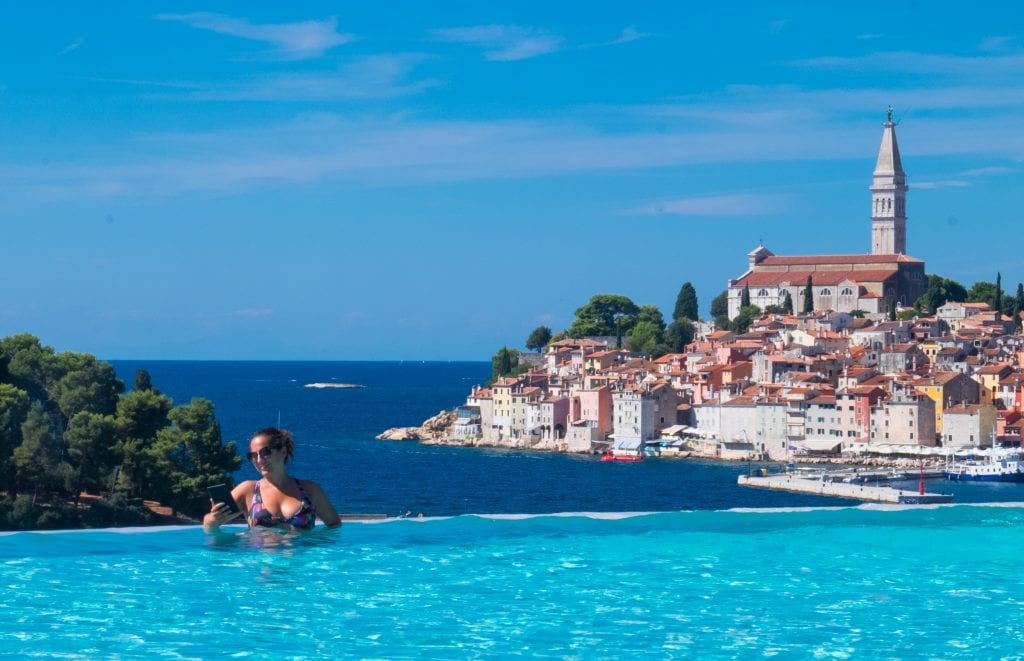
Should you make a “what if” plan?
I know a lot of people who are worried about what they would do if they test positive for COVID while abroad. What then? Do you stay where you are? Can you extend your stay, or will you need to find a new place?
Many countries’ entry forms, like the UK, ask you where you can quarantine if you need to quarantine. But I know nobody who actually plans on this happening.
It can’t hurt to make a general plan. Take a look at your accommodation (you might have an easier time if it’s a big hotel rather than a small guesthouse or Airbnb). How much would it cost to stay another two weeks? Do they have a plan for what to do when someone tests positive?
It’s also good to have a plan for what to do if you test positive once you get home.
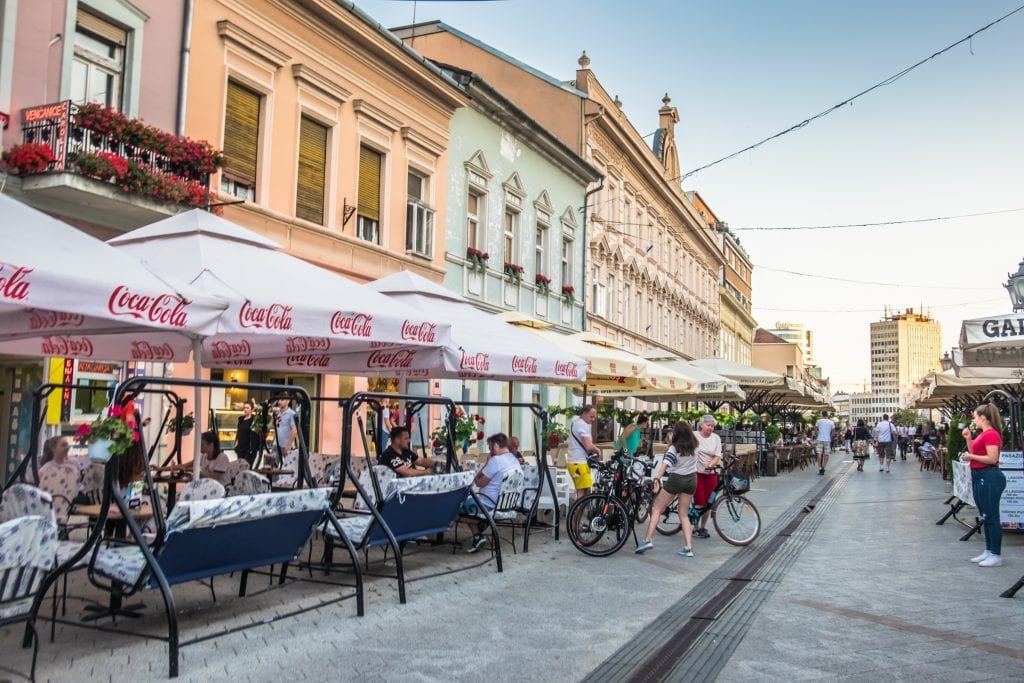
Travel insurance is a mess right now.
Travel insurance is vital — I never travel without it. But travel insurance has been in a strange place for the past year and a half because so few policies cover COVID care or travel changes due to COVID.
There has been a lot written about this by people who are more educated on the topic than I am, so I recommend doing some searching on travel insurance specifically.
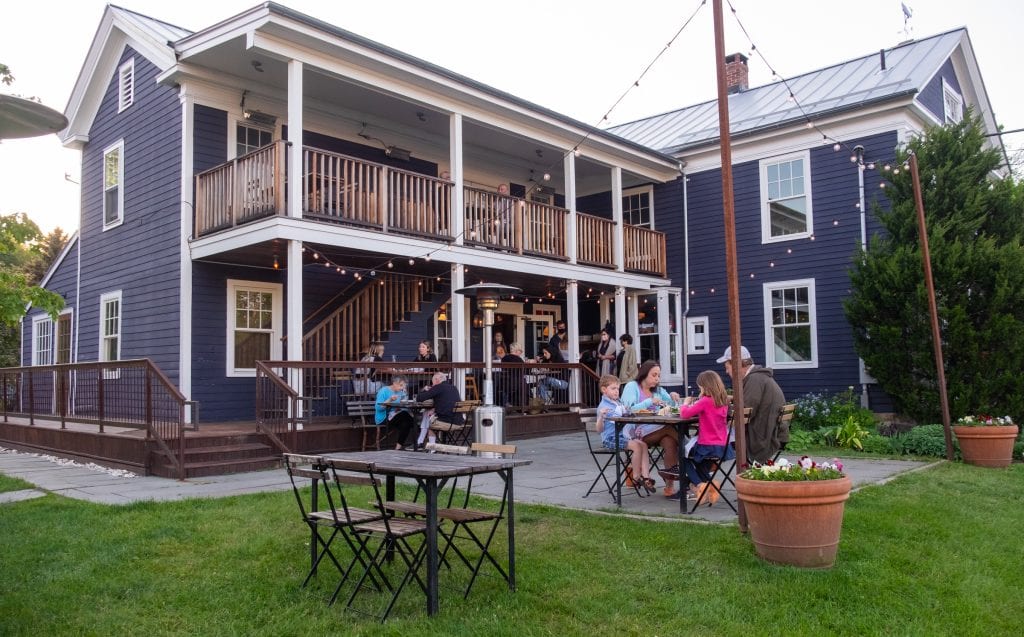
It’s okay NOT to travel, for whatever reason.
If you’re not ready, that’s fine. You don’t owe anyone an explanation. Even if you are a hardcore traveler who used to get on flights at the drop of the hat, climbed Kilimanjaro and hiked Machu Picchu, knows 10 great restaurants in Paris, and is the so-called “travel guy/gal” in your family, it’s okay not to go.
Many of us are still immunocompromised, or have loved ones who can’t risk catching COVID. The pandemic isn’t over yet, as much as we want it to be.
But on top of that, we’ve been living through a major trauma. You don’t recover from that instantly. I was looking back at my writing in the early days of the pandemic and I was struck by how deflated I sounded.
Take your time until you’re feeling ready to travel again. And if you’re not up for a plane ride yet but might be up for a distanced, outdoorsy local trip, I guarantee there are wonderful local spots within a few hours’ drive.
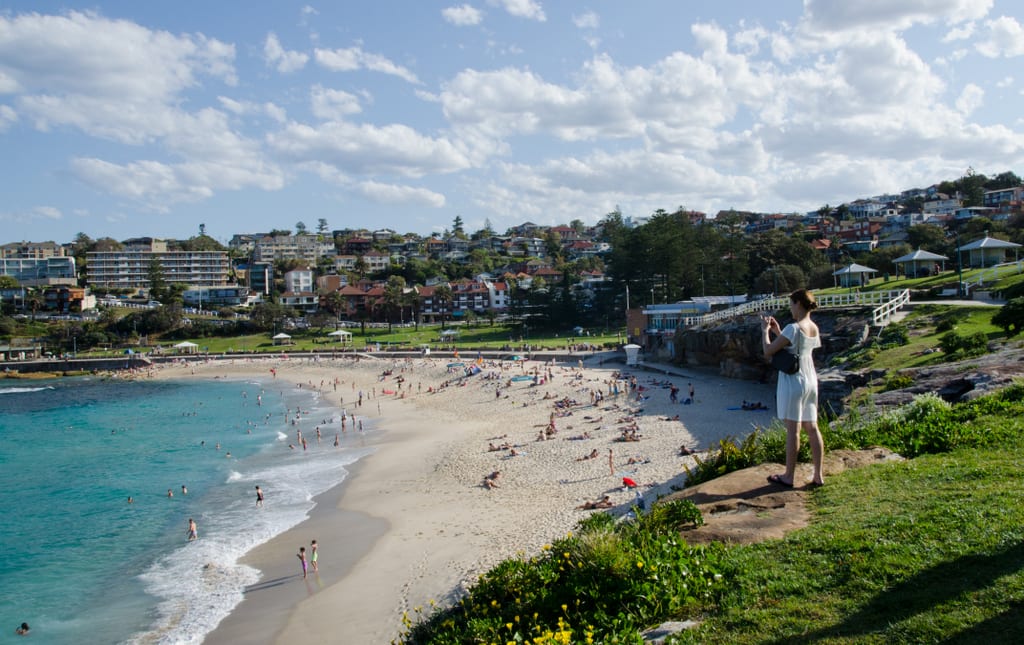
This pandemic has brought out the worst in many of my travel blogger colleagues.
I’ve gotten to know many travel bloggers over the past 12 years, and these are some of the most important relationships in my life. But COVID has brought out the worst in many of my colleagues.
Turns out that when you make travel the center of your life, some people interpret that as their right to travel — wherever they want, whenever they want — trumping literally everything else.
There’s the blogger who says that COVID is no big deal, that they’ll be fine if they get it, that they’re healthy, and they will continue traveling without taking any precautions. Ignoring all the incredibly healthy people who have died from it and continuing to spread misinformation to their audience.
There’s the blogger who decided to remain unvaccinated, travel to developing countries where vaccines are not required, and instead stock up on horse paste. Yes, I saw you in the public ivermectin Facebook group. We all did.
There’s the blogger who was so lackadaisical with safety regulations that they gave COVID to quite a few people. And less than a week after diagnosis, they were cafe- and bar-hopping once again.
There are a few bloggers who have been choosing to visit countries during severe COVID peaks, at times when people are dying on the street because hospitals are overflowing. There are so many other places you could go. Why there? Why then? Did it make you feel like a badass?
The selfishness astounds me.
At the same time, I want to acknowledge the bloggers who are doing good.
Thank you to the blogger with health issues for writing about how COVID could be deadly for her, and putting a face on “the immunocompromised” for so many people.
Thank you to the blogger who has been sharing her experiences living with long COVID, showing that even if you survive it, it could result in long-term disability.
Thank you to the many bloggers who have been doing right by their audiences: sharing accurate information, promoting struggling travel businesses and regions, and introducing their audience to new local options.
You are the best of us. Keep doing what you’re doing.
I Want to Hear From You
How are you planning international travel? I want to hear your thoughts. Share them below.
Hey Kate – great info here! I would just add a couple things: first, when I went to Croatia in early September, they did not require any proof of paid accommodation. Not sure if that has changed since then? Or if it was previously required and they eliminated that by the time I went this fall.
Second, for Americans looking for fast, reliable PCR testing, I highly recommend Sameday Health. They have locations all over the US, I’ve never had a problem getting an appointment (I went on 30 minutes notice on a Sunday a couple weeks ago after a potential Covid exposure) and their turnaround time has been very reliable in my experience – you can pay $75 for 16 hours or bill it to your insurance for free for 40 hours. I’ve done both and in both cases had my results in 8-12 hours. They also provide a very official looking certificate with a doctor’s signature, which some countries require.
Finally, the travel insurance thing is such a good point! More companies are starting to cover expenses if you get sick with Covid or have to quarantine but I have yet to find anyone who covers cancellation if your destination closes its borders or implements other restrictions that make it no longer possible for you to go.
Thanks, Katie! I updated it — seems they are no longer doing that.
Thanks for the rec of Someday Health. I took a look and they have multiple offices in downtown Boston. That is awesome to know! They charge $225 for rapid PCR testing if you don’t have insurance.
SO much helpful information here Kate.
It feels like your list of “things to consider” is comprehensive. While you (or anyone) doesn’t know all the answers to different locations, you broke things down and gave enough links to resources – so we can feel empowered while gathering info and making decisions.
Definitely a post I will be coming back to!
P.S. I am kind of barfing with all the entitled bloggers who clearly could care less about anyone other than themselves. I was hoping this type of travel blogger would be weeded out when Covid hit – bummer that they are still around.
Thanks so much, Sherri!
To be honest, I’m a bit surprised at how many people haven’t left travel blogging altogether. I thought a ton would be leaving.
Love this, I very much appreciate the bloggers (like you and the good ones you mention) who take proper covid precautions and don’t act like their “right” to travel is more important than other people’s lives and health.
Thanks so much, Anne!
One extra thing to add about PCR tests is that you need to check the language. When my nieces visited me in the UK from Germany in the summer their PCR test results had to be in English, French or Spanish. So instead of getting a cheap test from the pharmacy (which would have been in German) they had to go to the airport the day before their flights, which is quite a long journey, and pay for a much more expensive test to get the results in English. Having a test in the wrong language could have led to a £500 fine each.
So much good information! We are heading to Cancun in December-all inclusive resort that seems to have everything and everyone covered. Then an Indonesia trip in April 2022-we are keeping an eye on that, fingers crossed, and hopeful! We are in our 70’s so staying mindful of the risks, but fully vaccinated with booster.
We are full time RV travelers in the US. We can isolate in our tiny home as we need to. But, we try to do international travel to mix things up when we can. Besides new cultures, and new ideas, we meet such lovely people!
I appreciate your blog so much, and always look forward to it!❤️
As a medical professional who worked frontline covid I am appalled at how some of these bloggers behaved (I need some names so I can unfollow) but your post is fantastic. However I don’t agree the grocery store more dangerous airplane. Anytime you have people close together for hours, respiratory pathogens are more likely to be transmitted. You aren’t that close to people in grocery store nor there for hours. Anyway I would recommend not eating at the same time as other passengers. When all the masks are off at once, this is riskiest time. Definitely use N95 or equivalent on planes. Allianz yearly travel insurance policy does cover covid. This is what I use. Last point, if you want a rapid antigen test that you can take with you and use prior to returning to United States, Abbott Labs Binax makes a kit that is CDC approved that comes with a telegraph visit so you get an official result from your self test. Optum.com sells them 3 for $99. Kind of handy to have around for US travelers.
If you were uncomfortable in London, then you may want to reconsider your upcoming trip to Budapest because noooo one wears masks here and you’ll get funny looks if you’re the only one on transit or in a store with a mask on 😉
I cannot speak for overseas but during the height of Covid last year we took a month 11 State camping trip and visited some relatives. We did not plan on this but upon returning home I checked and 9 of the 11 States were Red States with virtually no restrictions, rarely we saw a mask. Two States were Blue but as we were camping we were not in any large metro areas and in the rural areas again no to very little restrictions, in a couple of the larger towns we did see mask requirements. The rural counties were Red, the larger towns Blue. This observation intrigued me so I followed through with some research to find those Red States and Counties without restrictions had no worse Covid numbers than other States and in many cases had far less. My suggestion is if you want to stay healthier and have a lot more fun and relaxing vacation plan your trips around Red States and Red Counties. This is based on actual reported case studies and facts from those States and Counties, not media hype. Take the time and check the statistics, after two years of Covid we now have the facts to look at.
I’m (hopefully) off to BC, Canada from the UK in 4 weeks time to visit extended family for Christmas and I’m terrified. I’ve been trawling the internet for travel advise and was unable to find anything actually helpful, that was, until I found this article! Thank you for the real talk, great information and advise. <3
I think my biggest fear is the ‘what ifs’. What if me, my husband or my son test positive? What if they don’t let us in? Etc. etc. My husband and I are fully vaccinated, but my son is 5 and isn’t. It LOOKS as though he has to have an arrival test at the airport and another on day 8, but not quarantine according to the Canadian gov website, but there is so little further information on this anywhere. Travelling with kids during Covid is a whole different ballpark! Any tips on that welcomed.
Great post! Sharing my experiences:
On a trip last summer to the U.S., I was dismayed that some restaurants wouldn’t serve us at their outdoor tables, saying they didn’t have enough staff. We went elsewhere for outdoor dining rather than go inside.
In NYC, I shopped for Covid testing for the return trip and got quotes of $250-$400! We got tested for free in Times Square.
On planes and trains, we double-mask (NYT has a good short video to show how–you twist the earloops on the bottom mask). And we use surgical masks. When I’m walking on crowded streets or going to the outdoor market, I’ll put on a cloth mask, because outdoor transmission is unlikely; otherwise I use surgical masks. It can be awkward–in France almost everybody masks indoors and even outdoors (on busy streets–not in the park). But in Amsterdam last month, people wore masks only on public transport and it seemed that in museums only tourists wore masks; no masks in shops or restaurants. We were scolded at an art gallery in Amsterdam for not disinfecting our hands (you can’t touch anything in a gallery! and I’d disinfected about 8 times in the previous hour, and Covid isn’t spread by touching surfaces). We were the only people in the gallery wearing masks, and somebody asked us whether we’d recently been in contact with someone with Covid. I said we were just being careful. And yes, we are vaccinated.
Great info! I’m hopefully going to Uganda in January, with a few days in Paris afterwards. Thanks for the reminder about the N95 masks for Europe. I also appreciate the extra reminder to do more travel insurance research than I usually do. (Are there any references that you found particularly helpful on the subject of travel insurance during the pandemic?) I think the only way I’d feel comfortable traveling right now, even though I’m vaccinated is if I know I have a few thousand dollars that I could tap in an emergency if I needed to quarantine.
I think there’s some over-dramatic info here. I live in London and have spent time in Greece, Spain, Scotland, and France in the past few months. There’s no need for special masks in any of these places! Reusable cloth masks are fine (and far less wasteful).
There’s no reason to feel uncomfortable or unsafe in the UK. We’ve had an extremely successful vaccine/booster rollout and cases are flat or declining in contrast with our European neighbors. We’re encouraged to take the free, widely available rapid tests constantly which is why you see very few people in masks – we are testing nearly daily so we know we aren’t spreading anything.
That may have been your personal experience, Fatima, but I notice that you didn’t visit Germany, the Czech Republic, Austria, or the many other countries that actually do require respirator masks.
And if you actually take a look at case numbers in the UK over time, they are not declining — since Delta took hold in mid-June, they’ve escalated, and since then there have been between 25k and 55k cases per day. When numbers were low, there were closer to 2k cases per day. Take a look and you’ll see.
Great Post. I was particularly interested in your journey through the ever changing paper work requirements.
I am immuno compromised and it has been horrible for my emotional health to not travel. I am at the point that traveling and coming down with COVID is less risky than my mental health. I am fully vaccinated with the 3rd booster shot and continue to wear a mask when in public. I cruised over 20+ times in the past and have had no sickness on any of my trips. I think the key is to wash your hands frequently and don’t put them near your face or in your mouth. Plus don’t eat off the ship.
3 yrs. ago we had planned and paid for a cruise to Antarctica. 2019 was canceled because of I was sick in the hospital and unable to travel. 2020 was canceled due to COVID. My travel companion and I decided due to our health, the COVID levels in Argentina (Jumping off spot to Antarctica) the necessary multiple flights and extra hotel nights, plus the cruise line was sailing at full capacity, we would postpone 2021. We did cancel because we know what disease hot spots cruise ships can be. A new cruise line “Atlas Ocean Voyages” cruises called and said they were sailing at 50 to 75% capacity and only allowing a maximum of 142 passengers on their ships. In addition they were chartering a flight directly to Ushuaia, Argentina, (prior to boarding ship to Antarctica) with no overnight hotel stays, and no multiple air flights. After careful consideration, we justified going since we would be on the same plane as the people on the cruise ship, no hotel stays, customs will come on board the plane with no detour through the airport, all passengers have to be vaccinated, and have a negative PCR test every three days, and they booked less than 100 people.
When we inquired as to how they handled other COVID positive passengers, we were impressed with their protocol. We feel our vaccinations currently cover all but the Delta variant and we don’t know what the future will hold as far as vaccinations go. We know we are taking a chance, but when weighing the knowns of this year versus the unknowns of next year we have decided to go. I will let you know how it goes. Thank you for your insight to recent traveling.